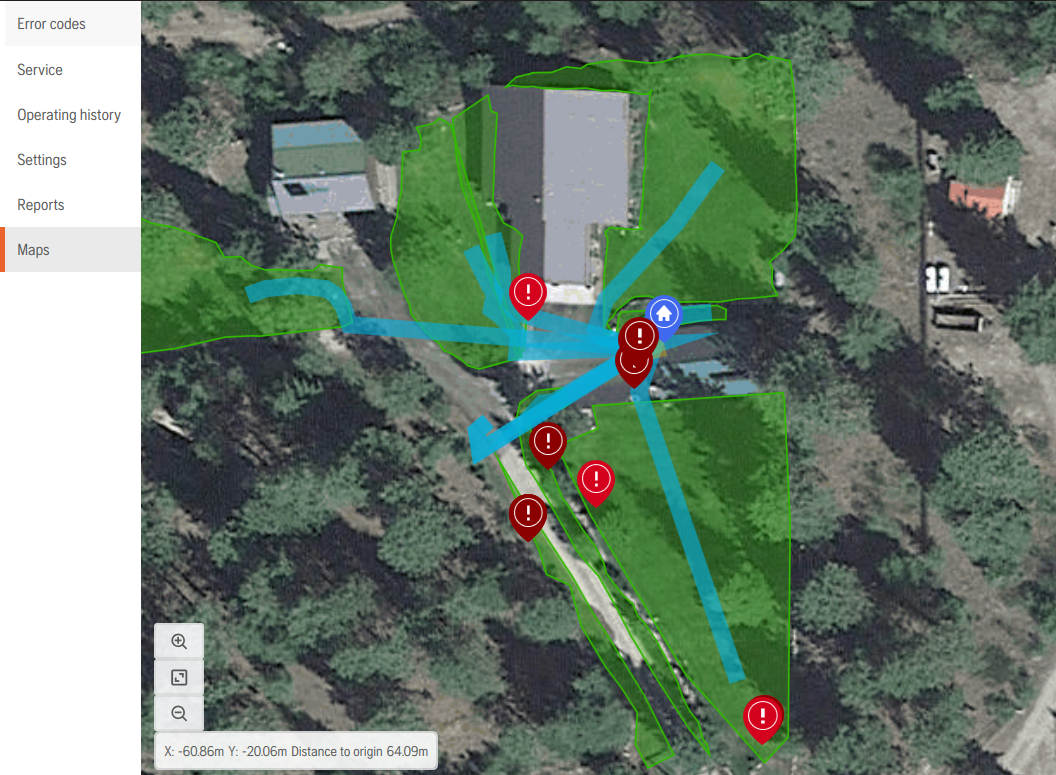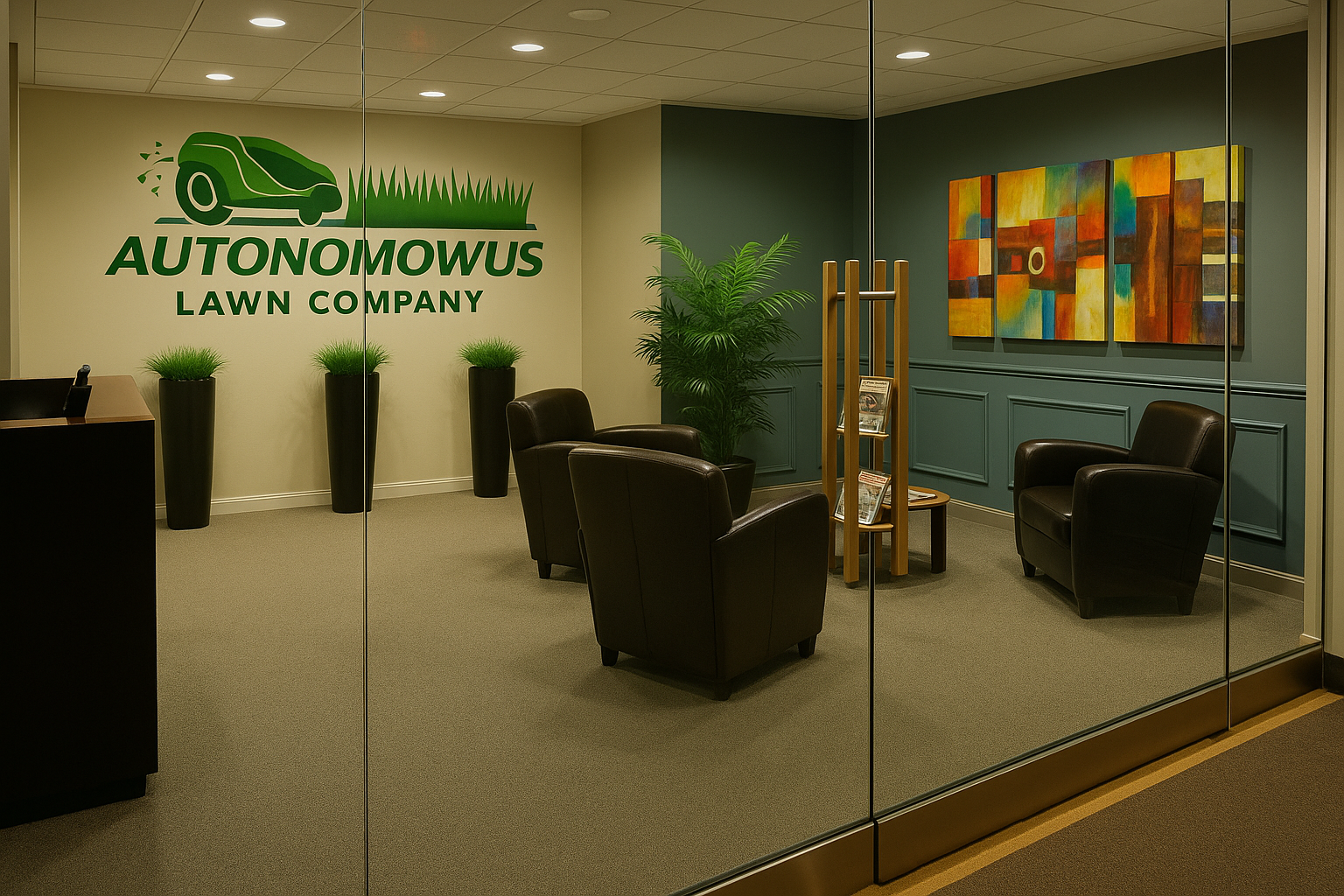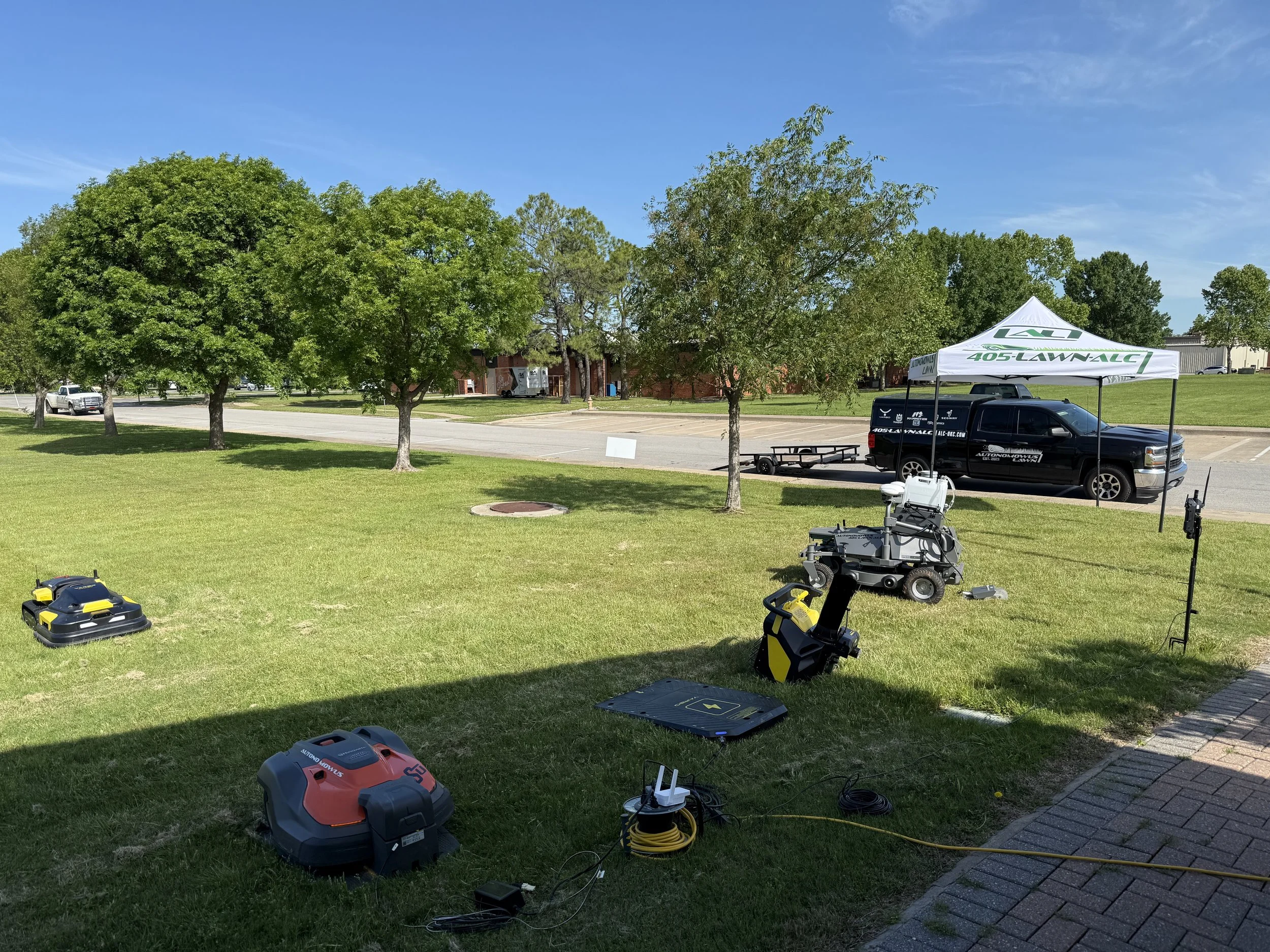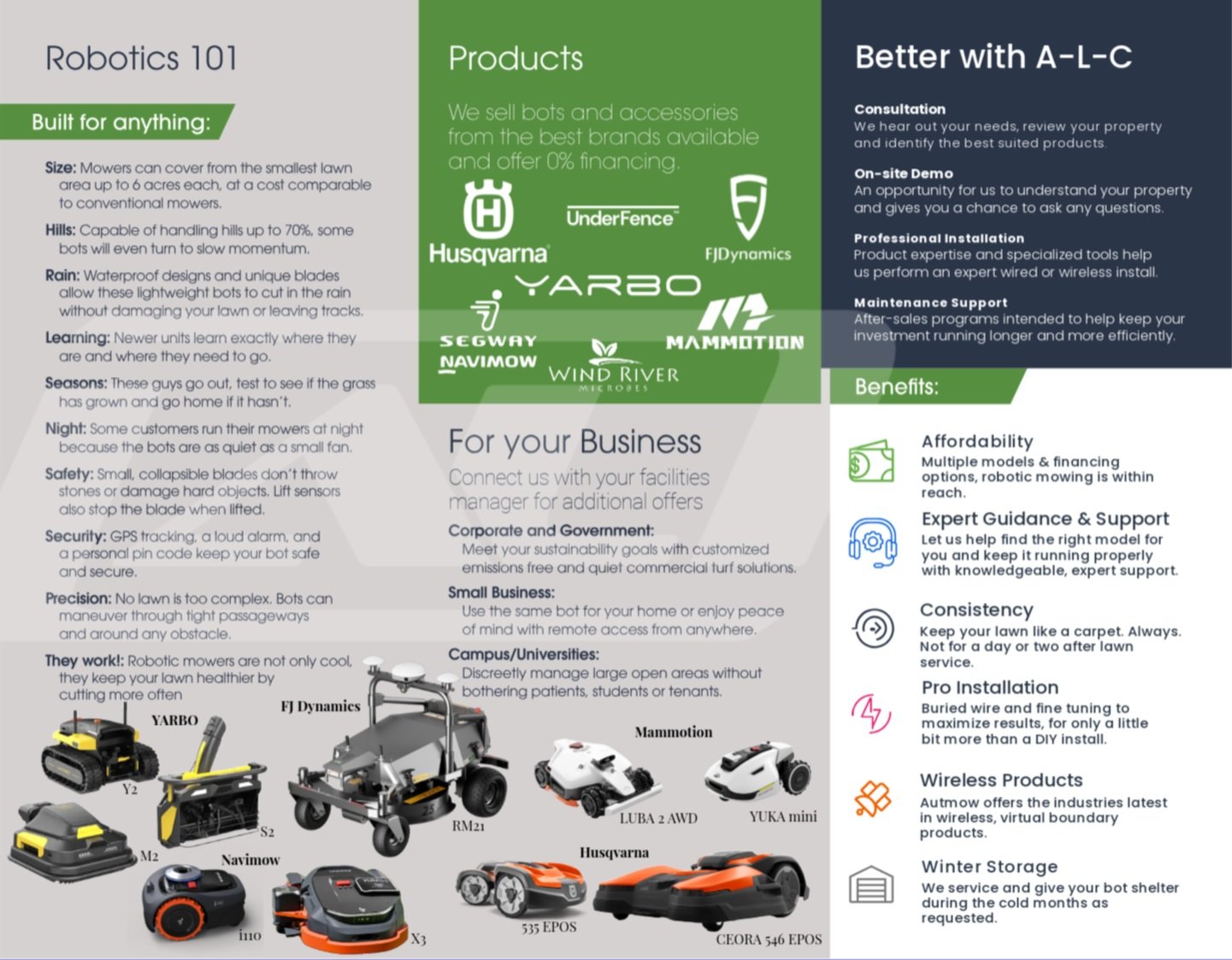
"My Front Yard Looks Great, But What About the Rest?": Managing Multiple Lawn Zones in Oklahoma City
At Autonomowus Lawn, we get this question a lot: "Can a robotic mower handle my whole property, or just part of it?" It's a great question, especially here in Oklahoma City where most homes have that classic setup—front yard, back yard, side strips, and maybe that awkward area by the driveway that never quite looks right.
The good news? Gone are the days when robotic mowers could only manage simple, single-area lawns. Today's technology has completely revolutionized how we think about complex properties. No more "mullet lawns"—you know, business in the front, party (or disaster) in the back.
Whether you're dealing with a sprawling Edmond estate, a Norman property with front and back yards separated by the house, or one of those classic OKC neighborhoods where driveways and fences create natural lawn divisions, modern robotic mowing can handle it all. Let's talk about how.

"How Often Should My Robot Mow?" The Question We Hear Every Week
At Autonomowus Lawn, we get a lot of questions. Some are technical ("Which brand works best with my smart home system?"), some are practical ("Can it handle my Saint Augustine grass?"), and some are wonderfully honest ("Will my neighbors think I'm lazy?").
But there's one question that comes up in nearly every conversation: "How often should my robotic lawn mower actually run?"
It's a great question, and honestly, it's the kind of thing that can keep new robotic mower owners up at night. You've made the investment, you want perfect results, and you're not quite sure if you should trust a robot to make decisions about your lawn.
The simple answer? It depends. But don't worry—that's not where we're leaving you hanging.
Why "It Depends" Isn't a Cop-Out
Just like asking a doctor "How often should I exercise?" or a mechanic "When should I change my tires?", the answer depends on your specific situation. Your Oklahoma lawn isn't exactly like your neighbor's lawn, and what works for someone in Edmond might need tweaking for someone in Norman.
Here's what actually matters when determining your mowing schedule:

"Alexa, Mow the Lawn": How the Smart Home Revolution Left Your Yard Behind
In 1950, a father joked in a public service announcement that kids had "so much free time these days." Fast forward 75 years, and Americans now spend more time on household chores than ever—unless they've embraced the smart home revolution.
We tell Alexa to dim the lights, ask Google to start the dishwasher, and let our Roombas vacuum while we're at work. Smart thermostats learn our schedules, and our refrigerators tell us when we're out of milk. Yet somehow, millions of Americans still spend their Saturday afternoons pushing heavy mowers across hot lawns, breathing gas fumes, and losing precious weekend time.
Why did our yards get left behind in the smart home revolution?
The Smart Home Timeline: Everything But the Lawn
The transformation has been remarkable:
1901: First electric vacuum cleaner
1950s: Automatic washing machines and dishwashers
1975: First microwave ovens go mainstream
2002: Roomba launches, robot vacuums take off
2010s: Smart home ecosystems explode (Nest, Alexa, Google Home)
2024: 69% of American homes have at least one smart device
The one glaring gap? Lawn care. While we automated indoor chores decades ago, most homeowners are still using the same basic mowing approach from the 1950s.

The Rising Demand for Robotic Lawn Mowers: Transforming Lawn Care
At Autonomowus Lawn, we've observed a significant increase in demand for robotic lawn mowers over the past few years. More and more homeowners and property managers are recognizing how these innovative devices revolutionize lawn care. Today, we'll explore how a robotic lawn mower can enhance your lawn care routine and improve your overall lifestyle.
Save Valuable Time for What Matters Most
Studies indicate that homeowners spend significant time each month on home maintenance, with lawn care representing a considerable portion of that effort. Weekends, in particular, are often spent pushing or carrying heavy equipment to keep lawns looking neat.
With a robotic lawn mower, that time can be reclaimed. These machines operate autonomously…

Why Robotic Lawn Mowers Are the Future of Lawn Care
At Autonomowus Lawn Company, we’ve seen firsthand how robotic lawn mowers are transforming the landscape—literally. These autonomous machines are changing how homeowners, property managers, and landscapers approach lawn maintenance, offering time savings, consistent results, and long-term cost efficiency.
While adoption in Europe has surged—with the market expected to exceed $1.25 billion by 2027—the U.S. is still catching up. But that’s quickly changing, especially in forward-thinking places like Oklahoma City, where more homeowners and businesses are embracing the future of lawn care.
Are Robotic Lawn Mowers Worth the Cost?
Many people hesitate due to the initial price tag. Entry-level robotic mowers start around …

How to Achieve LEED Certification for Your Business: A Path to Sustainability
It’s time for your business to "LEED" the way in sustainability (yes, we’re getting the puns out of the way early). Achieving LEED certification is a critical step toward establishing your commitment to sustainability, and it can help elevate your business's reputation in the process.
Continue reading to discover how you can integrate a green approach into your projects and achieve LEED certification.
What is LEED Certification?
LEED, or Leadership in Energy and Environmental Design, is a certification program offered by the U.S. Green Building Council (GBCI). It provides a framework for developing environmentally responsible, efficient, and cost-effective building projects. The objective is to create standards for the most sustainable and environmentally beneficial buildings, considering the broader impacts of a project.
LEED certification is globally recognized and applies to a variety of developments, including cities, residential communities, and neighborhoods. The certification can be earned for numerous types of projects, including:
New construction
Maintenance and operations
Interior design
Renovations and existing buildings
By reducing the carbon footprint associated with your business—encompassing staff, equipment, and operations—you can achieve LEED certification even if your project is already in progress.

The Best Robotic Lawn Mowers for Small Lawns in 2025
Are you looking for a high-quality robotic mower for your small lawn? We understand that investing in a traditional push mower for a small yard often seems inefficient. Maneuvering a large mower in a confined space requires frequent turnarounds, which can be both frustrating and time-consuming.
That's where small robotic lawn mowers come in. These compact machines are designed to consistently maintain a level lawn, efficiently navigate various angles, and offer significant time-saving advantages.
However, with so many options available, choosing the right robotic mower for your needs can be a daunting task. In this guide, we’ll share our top picks for the best robotic lawn mowers for small lawns in 2025.
Why Robotic Mowers are Ideal for Small Lawns
Wireless Features for Enhanced Convenience
Many traditional mowers are designed for larger lawns, with wide cutting decks to cover more ground. However, these models can feel cumbersome in smaller spaces, such as a yard the size of half a tennis court, where maneuverability becomes an issue. A traditional mower can be up to 33 inches wide, which in a small yard, feels overcrowded.
Robotic mowers, by contrast, offer the perfect solution for tight spaces. These mowers are compact and efficient, allowing you to maintain your lawn without feeling cramped by bulky equipment. They save you both time and money in the long run, with minimal effort required on your part.
Time Savings
One of the most significant benefits of robotic mowers is the time they save. After setting up the perimeter and the docking station—something Autonomowus Lawn can assist you with if needed—the mower will map your yard and begin mowing autonomously.
Once the initial setup is complete, you can connect the mower to your smartphone and monitor its progress while you handle other tasks around the house. No more spending hours pushing a mower!

Robotic Lawn Mowers: Battery Life and Longevity
Robotic lawn mowers have transformed lawn care, saving users time and reducing costs, particularly by eliminating the need for fuel used by traditional mowers. Despite their growing popularity, one question persists:
"How long does the battery last on a robotic mower? It can't be that long!"
If you’ve wondered the same, keep reading. By the end of this article, you’ll see that battery life isn’t just sufficient—it’s impressive. Plus, you’ll learn why it’s only part of what makes robotic mowers a game-changing solution.

How Businesses Can Overcome Landscaping Challenges with Robotic Lawn Mowers in Oklahoma City
The landscaping sector is currently facing a significant labor shortage, leading to increased costs and operational challenges for many businesses. According to recent insights from the National Association of Landscape Professionals (NALP), the scarcity of skilled labor remains a pressing issue, with thousands of landscaping jobs going unfilled each year. This shortage not only limits growth but also increases the uncertainty and costs associated with hiring contract firms. However, companies like Autonomowus Lawn offer innovative solutions that can help commercial entities mitigate these challenges by adopting robotic lawn mowers.

The Future of Lawn Care: Embracing Electric and Robotic Solutions
The Future of Lawn Care: Embracing Electric and Robotic Solutions
As we look to the future of lawn care, it’s clear that electric-powered solutions are becoming the norm. Soon, the loud, gas-powered lawn mowers of previous generations will be a thing of the past, replaced by quieter, cleaner, and more efficient alternatives.
We understand that you may have some reservations about this transition—questions about performance, cost, and the learning curve associated with new equipment. However, by the end of this article, you will see the substantial benefits of adopting electric and robotic lawn care technology for both your home and business.
Why Traditional Lawn Equipment Falls Short
We’re creatures of habit, and transitioning from traditional to electric lawn care tools can be a difficult adjustment for many. However, the drawbacks of conventional equipment are becoming harder to ignore:
